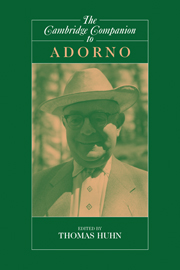Book contents
- Frontmatter
- Introduction: Thoughts beside Themselves
- 1 Negative Dialectic as Fate
- 2 Weighty Objects
- 3 Adorno, Marx, Materialism
- 4 Leaving Home
- 5 Is Experience Still in Crisis? Reflections on a Frankfurt School Lament
- 6 Mephistopheles in Hollywood
- 7 Right Listening and a New Type of Human Being
- 8 Authenticity and Failure in Adorno’s Aesthetics of Music
- 9 Dissonant Works and the Listening Public
- 10 Adorno, Heidegger, and the Meaning of Music
- 11 The Critical Theory of Society as Reflexive Sociology
- 12 Genealogy and Critique
- 13 Adorno’s Negative Moral Philosophy
- 14 Adorno’s Social Lyric, and Literary Criticism Today
- 15 Adorno’s Tom Sawyer Opera Singspiel
- Select Bibliography
- Index
15 - Adorno’s Tom Sawyer Opera Singspiel
Published online by Cambridge University Press: 28 May 2006
- Frontmatter
- Introduction: Thoughts beside Themselves
- 1 Negative Dialectic as Fate
- 2 Weighty Objects
- 3 Adorno, Marx, Materialism
- 4 Leaving Home
- 5 Is Experience Still in Crisis? Reflections on a Frankfurt School Lament
- 6 Mephistopheles in Hollywood
- 7 Right Listening and a New Type of Human Being
- 8 Authenticity and Failure in Adorno’s Aesthetics of Music
- 9 Dissonant Works and the Listening Public
- 10 Adorno, Heidegger, and the Meaning of Music
- 11 The Critical Theory of Society as Reflexive Sociology
- 12 Genealogy and Critique
- 13 Adorno’s Negative Moral Philosophy
- 14 Adorno’s Social Lyric, and Literary Criticism Today
- 15 Adorno’s Tom Sawyer Opera Singspiel
- Select Bibliography
- Index
Summary
We can’t run away
from this old house . . .
and if we run somewhere in fear
we still remain inside
this gives us fear and dread.
Adorno
The Treasure of Indian JoeEver since the academic world came to agree that philosophy is only possible as science, philosophers, who nevertheless cannot escape artistic production, go through life with both the mark of the conceptual poet and a bad conscience for it. The Phenomenology of Spirit, giving voice to an already widespread program - Hegel's own poetry notwithstanding - has it that the writers of the French Enlightenment, who presented their most important insights in the form of stories and novels, are too clever; that is to say, they write too well. Literary inferiority would certainly be a good characterization of a large part of the academic community - a community which has successfully lowered its ideal of science from the lofty heights of Hegel's investigation into things themselves down to the modest quest for knowledge about how we know things. The academic community has never forgiven Nietzsche for writing Thus Spoke Zarathustra and The Dithyrambs of Dionysos and has taken this as an excuse to declare the Genealogy of Morals irrelevant to the field as well. At least in Germany these experiences have been cause for caution in intellectual matters and have even intimidated intellectual inquiry. Those who prefer to write aphorisms rather than stale but transcendentally grounded puns about the being of being would do well to keep their theses to themselves until after they have passed their habilitation.
- Type
- Chapter
- Information
- The Cambridge Companion to Adorno , pp. 376 - 394Publisher: Cambridge University PressPrint publication year: 2004
- 3
- Cited by

